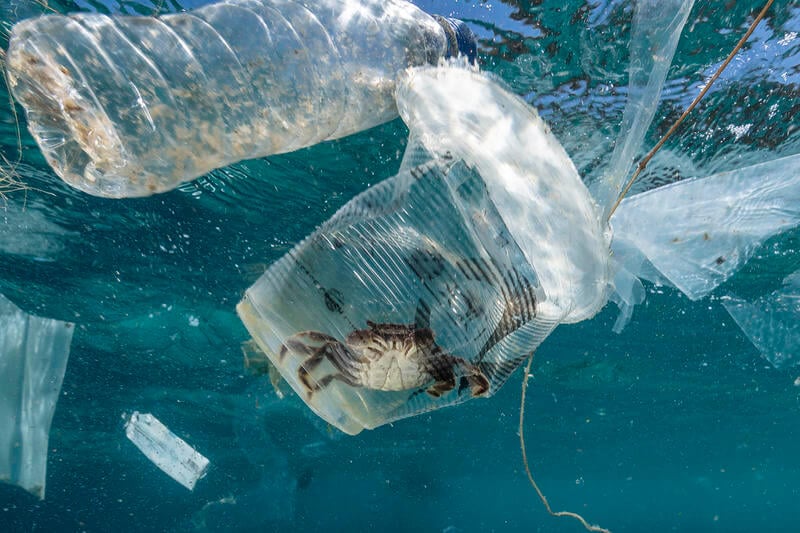Plastic Free July has begun, and now is the perfect time to review the key actions you can take to accelerate the transition to a plastic-free future.
Did you know that if business as usual continues, plastic production could triple by 2050? Triple! But because current plastic production is already causing a global pollution disaster, We need to draw a line in the microplastic-filled sand and say it’s time to end the age of plastic. Scientific studies (and our own eyes) have shown that Plastic is everywhereIt’s in our bodies, on the highest mountains, on remote lakes, on deserted islands, and in the air we breathe – where I sit right now as I write this blog. From office chairs to clothing, stuffed toys to tea bags, seedling pots to granola bar wrappers, personal care products to pens, a personal plastic-free challenge may be a futile endeavor for most of us, but… There are plenty of plastic villains to challenge.
Environmental Defence, Animal Justice and concerned activists rallied outside the Federal Courthouse in Toronto to support strong action against plastic pollution and #StopBigPlastic. Photo credit: Environmental Defence
big plastic
Big Plastic, a conglomerate of petrochemical and plastic manufacturing companies, is relentless in its evil ways and will stop at nothing to thwart government action to curb plastic pollution. In Canada, they have filed not one but two lawsuits against the federal government to block a ban on single-use plastics, and launched a marketing campaign spreading the false claim that plastic is the worst. Greenpeace research shows they are stepping up their lobbying efforts in line with the Global Plastics Treaty negotiations and federal action plan. Meanwhile, they continue to threaten the health of people and the planet, most recently in the unceded territory of Amjinang. INEOS Styrolution has released benzene, a known carcinogen, into the local community (again), triggering a state of emergency. 10/10 on the Plastic Villain scale.
Consumer Goods Brands
Fast Moving Consumer Goods (FMCG) companies such as Coca-Cola, Nestle, Unilever and other popular brands Global cleanup and brand audit reveals it to be the world’s top plastic polluter.Last year, Greenpeace UK accused Unilever’s Dove brand of contributing to the plastic pollution crisis, especially in countries in the Global South. Unilever sells 1,700 polluting single-use plastic bags every second. Dove says it cares about “real beauty,” but there is no beauty in a brand that pollutes the planet and threatens the health of communities. Over 140,000 people have already signed a letter to Dove, calling on them to commit to being a true force for good by stopping the sale of bags by the end of 2025, phasing out single-use plastics within 10 years, and advocating for these goals in the UN Global Plastics Treaty. While Unilever and other brands are making loose sustainability promises, the real-world impacts remain frightening. 9.5/10 on the Plastic Villain scale.
As part of the Reuse Revolution Global Refill Week activities, Greenpeace Canada volunteers placed cards on supermarket shelves calling for more unpackaged and bulk buying options, and more products offered in reusable packaging. Photo credit: Greenpeace
supermarket
In January 2019, Greenpeace A petition was started They are calling on Canada’s major supermarket chains to address their massive plastic footprints by phasing out single-use plastics and adopting reusable packaging and refillable product delivery models. Despite revealing their role in waste colonialism, public calls for customers and the public to remove endless amounts of unnecessary plastic from their shopping carts, and recent attempts by the federal government to pressure retail giants to quickly act on plastic reduction, supermarket aisles remain largely unchanged. Recent Environmental Defense Reports This is what I found out In the fresh produce and baby food sections alone, 70% of items are packaged in plastic. There is a ray of hope for reuse thanks to Reusables.com partnering with retailers to offer options, but plastic-free alternatives are very limited and far from being available in every store or community. 9/10 on the Plastic Villain scale.
What you can do!
The list of sources of plastic waste and pollution is devastatingly long. For every company promoting true reuse solutions, there are countless others working to reuse plastics. Changing our broken, plastic-dependent system is the path to a healthier, less polluted planet. This movement is strong and growing globally, despite powerful forces at work trying to keep us trapped in an extractive and exploitative “take, make, discard” economy. As the calls for change grow louder, we need to ensure that those voices are directed at 1. the companies that need to be held accountable for creating the plastic pollution and waste crisis in the first place, and 2. governments that can and should take bold action to accelerate a just transition to a zero-waste, low-carbon reality.
- Let’s urge Canada to support a strong global plastics treaty! This global problem requires a global solution. Negotiations for a UN treaty to end plastic pollution are progressing well, with the final round of talks scheduled for later this year. The stakes are high, and the potential for positive change is even higher.
- Urged Canada to support reuse-based systems Let’s develop a national reuse strategy!
- Commit to Ditch Dove! Until Dove eliminates single-use plastic bags, the company needs to know that its customers do not support the harm they are causing.
- Spread the news and stop Big Plastic! Learn more about how Greenpeace is working with Ecojustice and other organizations to maintain Canada’s plastic ban, and share this blog to show your support for the single-use plastic ban.

I take action










